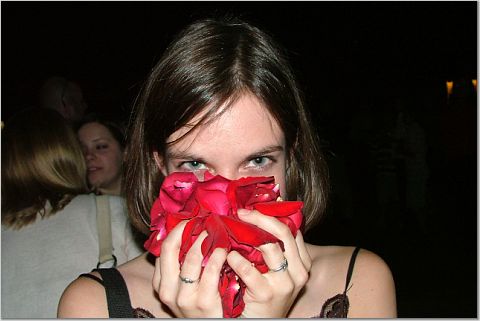Well, we're finished with Blindness. For those of you who haven't read it, I won't spoil the ending, but I will tell you that there is hope at the end of the book. The tragedy and horror of the middle chapters doesn't last forever. We're moving on to another tough book (Shusaku Endo's Silence) starting Monday, but I wanted to flesh out a few more thoughts about Blindness.
In our discussion on Monday, my friend Taylor pointed out the flip side of the tragedy of being blind: Not only can these people not see, but they cannot be seen. That might not seem so bad to some people - in fact, it became an excuse and an easy way for the criminal element to do whatever they wanted. No one was going to catch them at it; no one would hold them accountable; they no longer had to answer to the law or, past a certain point, their own consciences. And it would certainly be easier on people who had glaring physical flaws or deformities. No one could see them now.
And yet...being seen goes along with the idea of my other post on Blindness - being loved, and being called by name. There's a certain parallel in the world of romantic love: a woman preparing for a date will dress and apply makeup more carefully than a woman eating alone, in most cases. In a broader sense, being seen is in some ways equivalent to being loved, and being called by name. The people who love you take the time to look at you. They help form your identity by truly seeing you, and naming you. People who are always overlooked eventually form the opinion, however subconscious, that they aren't worth anything. In some ways, identity is communal, and that part of a person's identity disappears if no one is left to see them. (What good is it to have a name, for example, if there is no one who cares enough to call you by it?)
The doctor's wife (remember her from the last post?) nearly reaches the point of exhaustion near the end of Blindness; she and her husband take refuge in a crowded church after a rather harrowing shopping expedition. Her husband, trying to encourage her, remarks, "You can still see," to which she replies, "I'll see less and less all the time, even though I may not lose my eyesight I shall become more and more blind becuse there will be no one to see me." Even she, who has been the hope - and in some ways the identity - of the people for whom she is caring, knows that eventually we all go blind if there is no one to see us.
This is truly one of the most disturbing books I've ever read...possibly the most heart-wrenching as well. But having finished it, I can now say that it's ultimately a very redemptive book. You do have to "wade through the crap," in the words of my esteemed professor, to get to the good stuff; but I would say that ultimately the journey is worth it. It's taught me to appreciate, aong other things, the ability to truly see - and the blessing of being seen.


0 Comments:
Post a Comment
<< Home